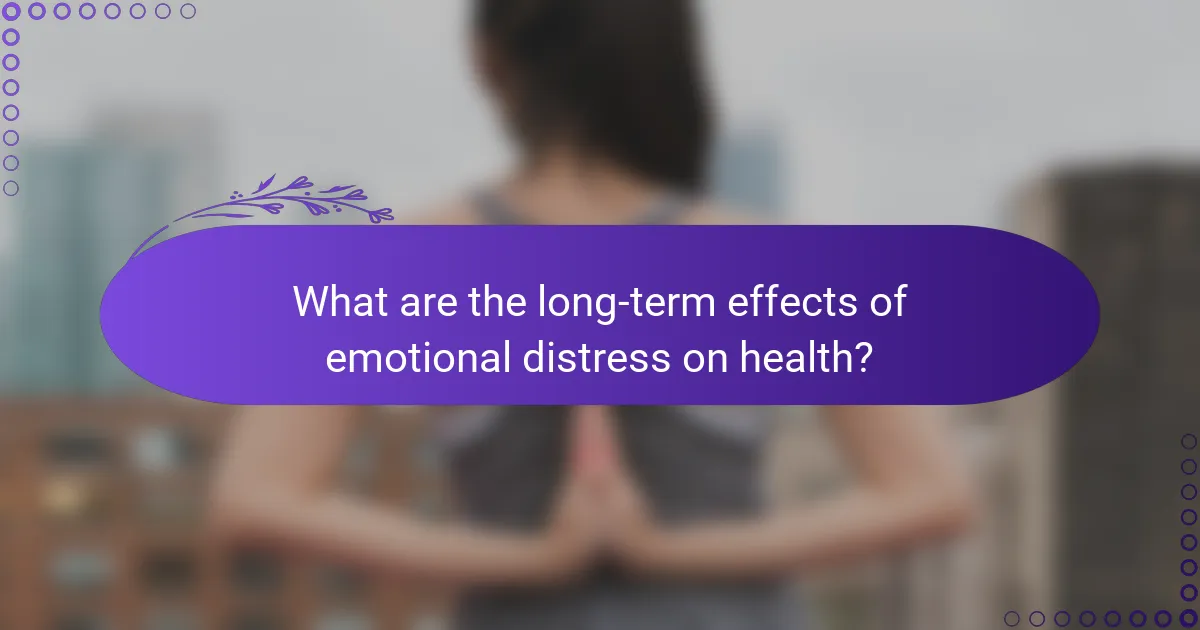The intricate connection between emotions and physical health reveals that our emotional state can significantly influence various bodily systems. Negative emotions such as stress and anxiety can lead to serious health issues, while positive emotions contribute to enhanced well-being and recovery. Understanding and managing these emotions through techniques like meditation, exercise, and proper nutrition can foster resilience and improve overall health.

How do emotions affect physical health?
Emotions significantly influence physical health by impacting various bodily systems. Negative emotions like stress, anxiety, and depression can lead to serious health issues, while positive emotions can enhance well-being and recovery.
Stress impacts immune function
Chronic stress can weaken the immune system, making the body more susceptible to infections and illnesses. When under stress, the body releases hormones like cortisol, which can suppress immune response over time.
To mitigate stress, consider practicing relaxation techniques such as deep breathing, meditation, or yoga. Regular physical activity can also help reduce stress levels and bolster immune function.
Anxiety leads to chronic pain
Anxiety can manifest physically, often resulting in chronic pain conditions such as headaches, back pain, or gastrointestinal issues. The body’s heightened state of alertness can lead to muscle tension and discomfort.
To address anxiety-related pain, cognitive-behavioral therapy (CBT) and mindfulness practices can be effective. Staying active and engaging in hobbies can also distract from anxiety and alleviate pain symptoms.
Depression affects cardiovascular health
Depression is linked to an increased risk of cardiovascular diseases, as it can lead to poor lifestyle choices such as inactivity and unhealthy eating. The emotional strain can also affect blood pressure and heart rate.
To improve cardiovascular health while managing depression, consider regular exercise, a balanced diet rich in fruits and vegetables, and seeking support from mental health professionals. Monitoring heart health through regular check-ups is also advisable.

What are effective strategies for managing emotions?
Effective strategies for managing emotions include practices that promote emotional awareness and regulation. Techniques such as meditation, exercise, and Cognitive Behavioral Therapy (CBT) can significantly enhance emotional health and resilience.
Meditation improves emotional regulation
Meditation is a powerful tool for enhancing emotional regulation by fostering mindfulness and self-awareness. Regular practice can help individuals recognize their emotional triggers and respond to them more thoughtfully rather than reactively.
To get started, set aside a few minutes each day for meditation. Focus on your breath or use guided sessions available through various apps. Aim for consistency, gradually increasing your practice duration to around 10-20 minutes daily for optimal benefits.
Exercise enhances mood and reduces stress
Exercise is known to boost mood and alleviate stress through the release of endorphins, often referred to as “feel-good” hormones. Engaging in physical activity can lead to improved emotional well-being and a reduction in anxiety levels.
Incorporate at least 150 minutes of moderate aerobic exercise each week, such as brisk walking or cycling. Strength training twice a week can also contribute to emotional health. Find activities you enjoy to make it easier to stick with a routine.
Cognitive Behavioral Therapy (CBT) for emotional health
Cognitive Behavioral Therapy (CBT) is an evidence-based approach that helps individuals identify and change negative thought patterns affecting their emotions. By addressing these cognitive distortions, CBT can lead to improved emotional responses and healthier coping strategies.
Consider seeking a licensed therapist trained in CBT for personalized guidance. Sessions typically involve identifying specific emotional challenges and developing practical skills to manage them effectively. Many find that 5-10 sessions can lead to significant improvements in emotional health.

How can nutrition influence emotional well-being?
Nutrition plays a crucial role in emotional well-being by affecting brain chemistry and hormone levels. A balanced diet rich in essential nutrients can enhance mood, reduce anxiety, and promote overall mental health.
Omega-3 fatty acids boost mood
Omega-3 fatty acids, found in fatty fish, flaxseeds, and walnuts, are known to improve mood and reduce symptoms of depression. These healthy fats support brain function by promoting the production of neurotransmitters like serotonin, which regulates mood.
Incorporating omega-3s into your diet can be as simple as consuming two servings of fatty fish per week or adding flaxseed oil to smoothies. Aim for a daily intake of around 250-500 mg of combined EPA and DHA for optimal benefits.
Gut health impacts mental health
The gut-brain connection highlights how gut health directly influences mental well-being. A healthy gut microbiome can produce neurotransmitters and short-chain fatty acids that positively affect mood and anxiety levels.
To support gut health, include fermented foods like yogurt, kefir, and sauerkraut in your diet. Aim for a diverse range of fiber-rich foods, such as fruits, vegetables, and whole grains, to nourish beneficial gut bacteria.
Balanced diet reduces anxiety symptoms
A balanced diet that includes a variety of nutrients can help alleviate anxiety symptoms. Foods rich in vitamins, minerals, and antioxidants support brain health and help regulate stress hormones.
Focus on whole foods, such as leafy greens, lean proteins, and whole grains, while minimizing processed foods high in sugar and unhealthy fats. Regular meals and snacks can help maintain stable blood sugar levels, which is essential for managing anxiety.

What role does sleep play in emotional and physical health?
Sleep is crucial for both emotional stability and physical well-being, impacting mood regulation and bodily recovery processes. Adequate sleep helps maintain a balanced emotional state and supports the body’s healing mechanisms.
Poor sleep increases emotional reactivity
Lack of sleep can heighten emotional responses, making individuals more prone to irritability and anxiety. When sleep is insufficient, the brain’s ability to regulate emotions diminishes, leading to increased stress and mood swings.
For example, people who sleep less than seven hours a night may find themselves reacting more intensely to everyday stressors. This heightened emotional reactivity can strain relationships and hinder effective communication.
Sleep deprivation affects physical recovery
Inadequate sleep significantly impairs the body’s ability to recover from physical exertion and illness. During sleep, the body repairs tissues, synthesizes proteins, and releases growth hormones, all of which are essential for recovery.
For instance, athletes who do not get enough sleep may experience longer recovery times and decreased performance. Prioritizing 7 to 9 hours of quality sleep can enhance physical recovery and overall health.
Quality sleep improves emotional resilience
Getting quality sleep fosters emotional resilience, allowing individuals to cope better with stress and adversity. Well-rested individuals tend to have a more positive outlook and are better equipped to handle challenges.
To improve sleep quality, consider establishing a consistent sleep schedule, creating a calming bedtime routine, and minimizing screen time before bed. These practices can lead to better emotional regulation and overall mental health.

What are the long-term effects of emotional distress on health?
Long-term emotional distress can significantly impact physical health, leading to various chronic conditions. Prolonged stress and unresolved emotional issues can manifest in serious health problems, affecting both mental and physical well-being.
Chronic stress leads to heart disease
Chronic stress is a major contributor to heart disease, as it can lead to high blood pressure, increased heart rate, and inflammation. Over time, these factors can damage blood vessels and increase the risk of heart attacks and strokes.
To mitigate the risk, individuals should adopt stress management techniques such as regular exercise, mindfulness practices, and adequate sleep. Avoiding excessive caffeine and alcohol can also help maintain heart health.
Emotional trauma can cause autoimmune disorders
Emotional trauma has been linked to the development of autoimmune disorders, where the immune system mistakenly attacks the body’s own tissues. This connection may arise from chronic stress, which can dysregulate immune function and lead to inflammation.
To reduce the risk of autoimmune issues, it is essential to address emotional trauma through therapy, support groups, or stress-reduction strategies. Early intervention and self-care practices can play a crucial role in maintaining overall health.


